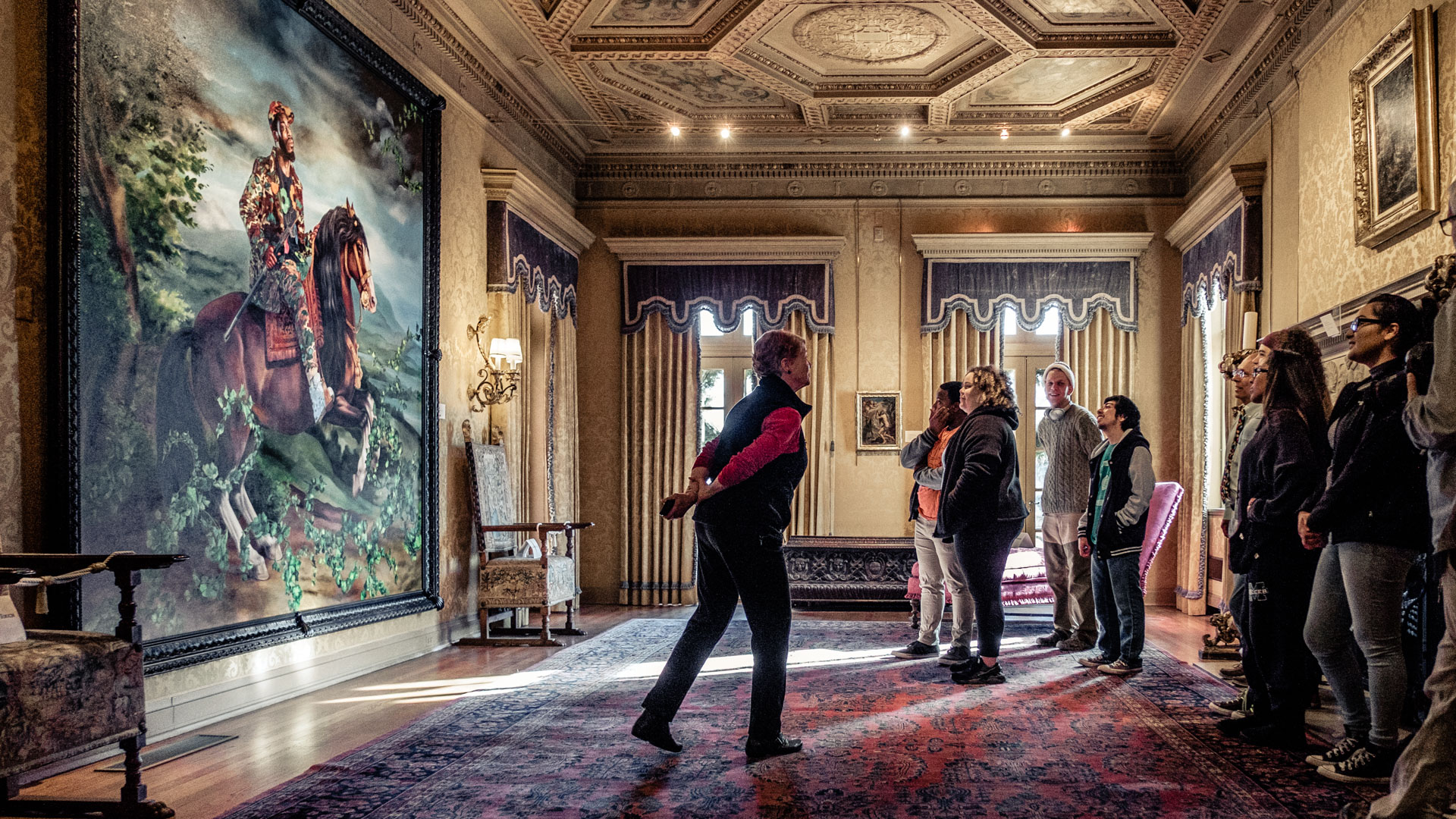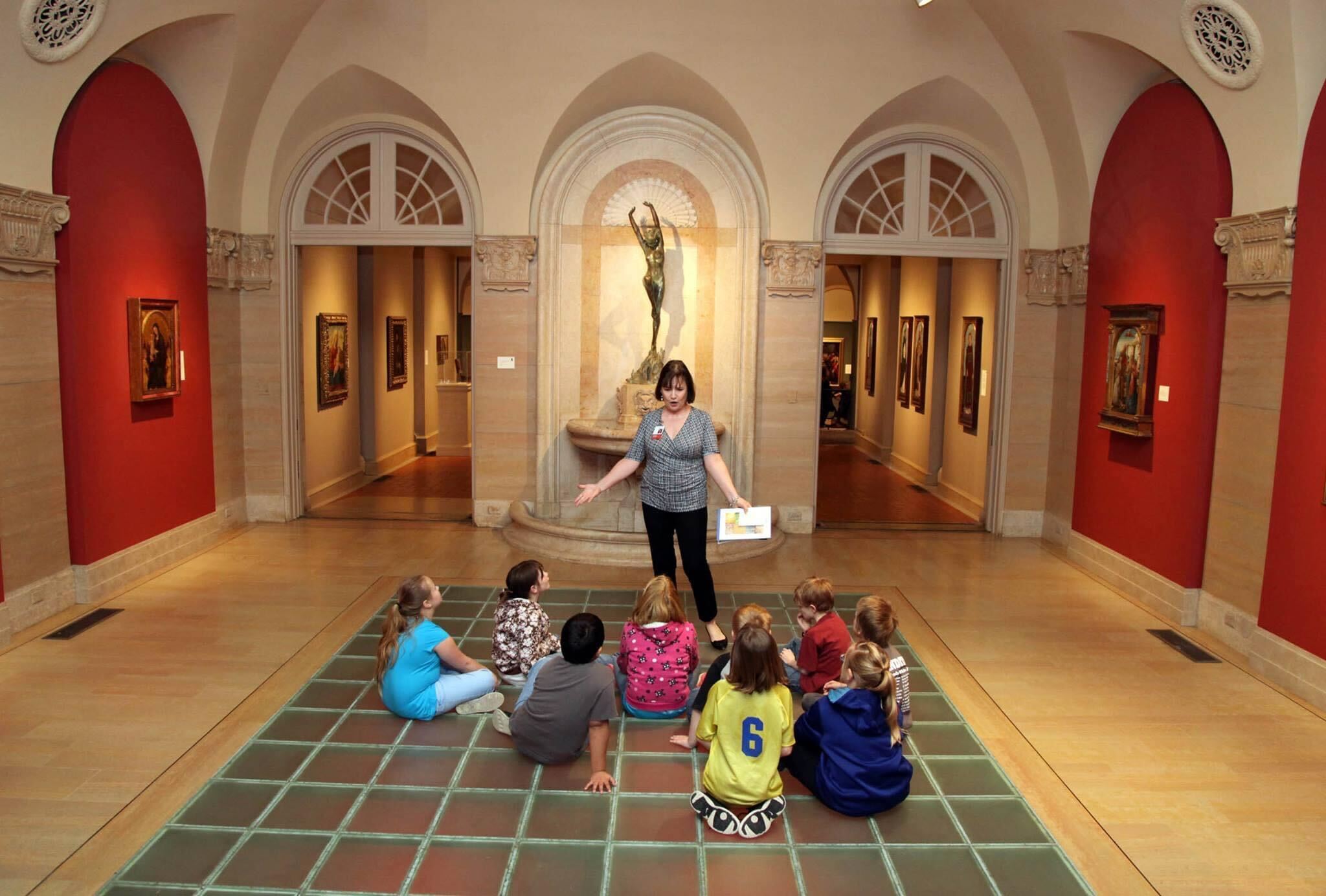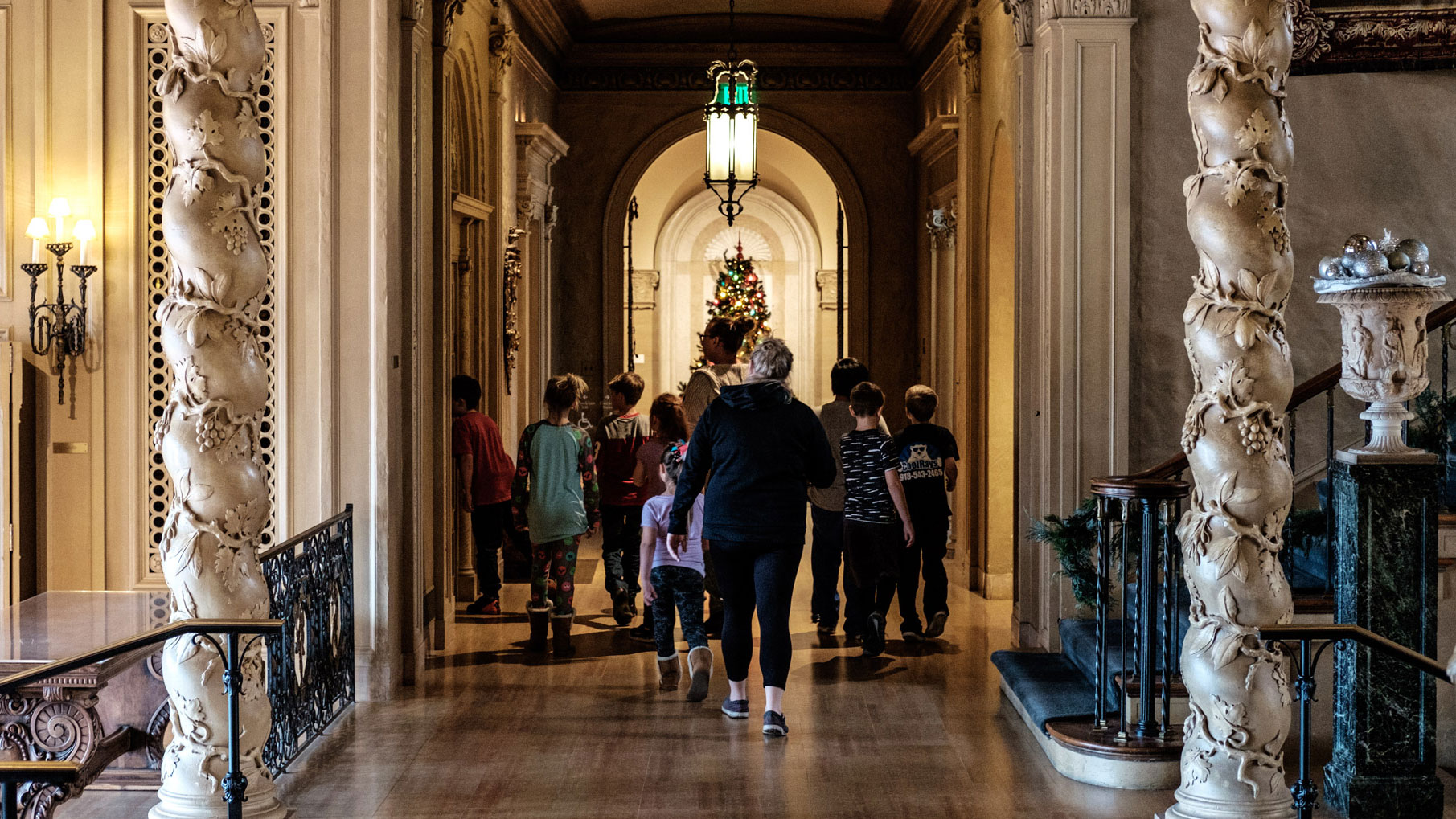Becoming a Docent
Applications for Fall 2024-Spring 2025 are closed. Applications for Fall 2025-Spring 2026 will open in late May of 2025.
What is a docent?
The word “docent” (pronounced DOE-sent) is derived from the Latin word docere, meaning ‘to teach’. Docents are trained by museum staff to act as guides, interpreters, community representatives, and much more!
Docents are essential to the educational mission of Philbrook. They are enthusiastic volunteers who share their passion for art, history, and gardens to connect our visitors to the museum.
What do Philbrook docents do?
Docents lead public tours for all ages at the museum. They use different engagement techniques to start conversations about art, culture, history, and the world around us. They help visitors think critically and creatively while connecting them to the collection, the gardens, and each other.
Docents help with museum programs and events as greeters, wayfinders, or an extra pair of hands where needed.
Docents represent the museum at outreach events including festivals, block parties, art fairs, and other community gatherings with partner organizations.
Some docents have leadership positions on the Docent Council. The council organizes social events and educational outings, distributes an internal newsletter, and advises on tour and program functions.
Who can become a docent?
Anyone with a passion for art, history, gardens, and a desire to inspire is welcome to apply. There are no educational or professional requirements for becoming a docent.
Docents-in-Training will be trained by museum staff on everything they need to know.
Philbrook respects, values, and celebrates the unique attributes, characteristics, and perspectives that make each person who they are. We believe that our chief strength lies in human diversity, both within our organization and among the visitors and communities with whom we engage. We seek out diversity of participation, thought, and action, and work affirmatively and strategically to be inclusive. For us, diversity, equity, inclusion, and accessibility are drivers of organizational excellence.
What are the benefits of being a docent?
Docents receive specialized training by museum staff and professional speakers. Those who complete the training will emerge with a comprehensive understanding of the museum’s collections as well as practical skills in public engagement and community outreach. Additionally, they will learn best practices regarding diversity, equity, inclusion, and accessibility.
Docents are invited to special events and parties throughout the year in addition to an annual volunteer recognition luncheon. We emphasize community building as much as continued education. Philbrook is a place to make lifelong friendships and to be a part of an amazing team.
How do I become a docent?
Complete the online Docent Application form available between May 1 and July 1.
Candidates will be selected to interview between June 1 – August 1. Interviews last up to 45 minutes and are conducted by the Manager of Tour & School Programs and/or representatives from the Docent Council. Not all who apply will receive an invitation to interview due to the high number of applications we receive.
After interviewing, select candidates will be sent further information to confirm their understanding of the requirements involved in the program. Upon agreeing to these, select candidates will be invited to join the Docent-in-Training Class of 2025.
Philbrook’s Mission and Values
Beyond being able to commit to the training hours and requirements, we’re looking for candidates who are enthusiastic, flexible, and committed to the museum’s mission and values.
Please follow the links immediately below to learn more:
Is there a minimum time commitment required to be a docent? What are the requirements for graduating from the Docent-in-Training program?
Docents are not required to give a certain number of hours to stay in the program after graduating. Some volunteer a few hours each month while others are at the Museum several days of the week. Volunteer opportunities are available mainly during the work week, as well as some select evenings and weekends.
Docents-in-Training have more intensive time requirements. They are asked to attend two-three trainings each month from September 2024 to May 2025. Each training is one and a half hours long, from 10:00-11:30 a.m. These generally take place on Mondays or Tuesdays. Additional time may be required in the galleries from 9:00-10:00 a.m. on select training days.
In addition to training sessions, Docents-in-Training must shadow several tours (for visitors of all ages) throughout the year while following an experienced docent. During a shadowing session, the Docent-in-Training observes the tour in progress. There is no expectation that they would facilitate any part of the tour.
Tours generally happen during the work week and are between thirty minutes to one hour in duration. Docents-in-Training should expect to commit an additional two hours each month to complete their shadowing requirements.
After finishing the shadowing component, Docents-in-Training are expected to lead sequential tour stops with an experienced docent at their side. This means the Docent-in-Training would start by facilitating one piece of art with a public tour group while the experienced docent would lead the rest of the tour. The next time around, the Docent-in-Training would lead at least two of the stops. The final requirement is for the Docent-in-Training to lead an entire tour. Each time, the experienced docent would be there to jump in as needed and provide feedback or suggestions after the tour ends.
In addition to training and shadowing, Docents-in-Training will create two tour plans: one for a school-age group and one for an adult group. They will complete these assignments with the assistance of an experienced docent.
The final requirement for Docents-in-Training is to research and prepare a thirty-minute presentation for their peers. These presentations center around one work of art in the collection and take place on days when the museum is closed to the public. These presentations are a great way for Docents-in-Training to practice facilitation skills in front of a supportive audience.
Over the course of the program, the total time commitment for training, shadowing, and other requirements is about fifty hours. This equates to about six hours of your time each month.
Upon completing the program, what flexibility can I expect as a docent?
Docents choose to volunteer with the tour groups, events, and programs that best suit them. They are never assigned work.
What accessibility options are there for docents?
Touring docents have the option to give stationed tours, remaining in one room or outdoor area while tour groups cycle through. Docents may use stools or chairs during tours. Docents can create tour routes that utilize elevators and ramps. Seating can be provided during events and festivals as needed.
If you have questions about additional accessibility options at Philbrook, please contact Melissa Ski at mski@philbrook.org or 918-748-5309.
What support will I receive as a docent?
Docents-in-Training are assigned a mentor at the beginning of the program. Mentors help create a warm and welcoming environment for new recruits, monitor their progress in the program, and offer their advice and experience throughout the first year. Mentees are expected to meet with their mentor at least once a month and communicate regularly via email, phone, or in-person.
The Manager of Tours and School Programs is the primary contact, trainer, and staff liaison for the docents. They oversee the program and maintain an open door policy for any questions, concerns, or suggestions from the docent corps.
Docent Applications are currently closed.
Applications for Fall 2024-Spring 2025 are closed. Applications for Fall 2025-Spring 2026 will open in late May of 2025.



